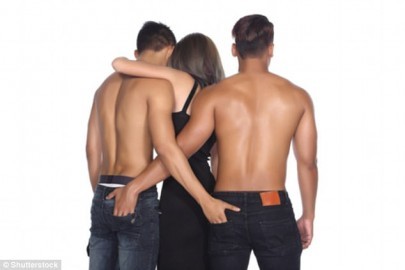A British sociologist who has studied for a PhD in threesomes has revealed some strange trends in the sexual experiences of young people.
His findings reveal that the rise of bromances and acceptance of homosexuality has led to more threesomes between two men and a female.
Many men reported that these encounters are a way to bond with their closest male friends.
Dr Ryan Scoats, an expert at Birmingham City University, said he decided to study threesomes after a number of his own ménage à trios encounters.
Of the 30 male students that Dr Scoats spoke to, a third had had a threesome by their second year of study, and six had had more than one.
Of the ten men who had a threesome, seven had been in at least one famel-female-male (FFM) threesome, and five had been in at least one male-male-female (MMF) threesome.
Two participants had experienced both.
The sociologist found there is often little physical interaction between men during MMF threesomes.
For example, in Dr Scoats’s research paper, an interviewee named Brent says, ‘You get to “high five” your mate over her back and that’s about it really.’
Instead, the men reported that these encounters are a way to bond with their closest male friends.
Another interviewee, Matthew, said: ‘It was quite a funny, a good experience. We both had a bit of banter between us. It was quite fun. It was quite enjoyable’.
Instead, the researchers describe the male-male encounter as ‘semi-sexual’, meaning that while the men didn’t sexually interact with one another, they did engage sexually at the same time with the woman.
The sociologist suggested that the rise of the ‘bromance’ and decline in homophobia in western societies is helping to make MMF threesomes more acceptable.
‘Younger guys engaging in threesomes are shifting along with society toward being less homophobic,’ Dr Scoats told MailOnline.
‘This is allowing them to have threesomes with other men without it challenging their sexuality.
‘The trend ties into bromances, and shows that modern men are more comfortable with their male friends.’
In a separate study, the sociologist also spoke to a number of women, finding that many are intimidated by the thought of a threesome with two men.
One interviewee, 25-year-old Nadia, said: ‘My only knowledge of men, like two males, one female threesomes is from porn, and it always just seems absolutely brutal.’
But the research found that, for some women, these fears are allayed if the two men interact sexually during the encounter.
One interviewee, 26-year-old Isa, said: ‘If there is no homo, there is no trio. I find it really annoying if they are reluctant to touch each other.’
Dr Scoats told MailOnline: ‘Women are generally more reluctant to engage in MMF threesomes than men, maybe because they find it intimidating or objectifying.
‘But when it’s suggested the males will be interacting sexually, for some women, this can be anxiety-reducing because they appear less like an object.’
Dr Scoats said that while tolerance of threesomes was on the rise, ménage à trios remains a heavily stigmatised sexual activity.
Stereotypical issues borne from threesomes, such as jealousy or ruining relationships, are not seen in the research.
Dr Scoats told MailOnline: ‘Threesome sex is just like any other sex, people do it for different reasons and it has different outcomes. Society stigmatises this behaviour.’
Research published earlier this month suggested that many men find ‘bromances’ – close friendships with other men – more emotionally rewarding than their romantic relationships with women.
Experts at Winchester University found that men felt ‘less judged’ by their close male friends than their girlfriends.
They also found it easier to solve conflicts and speak openly about their emotions in their bromances.
‘BROMANCES’ IN YOUNG MEN
Research published earlier this month suggested that many men find ‘bromances’ – close friendships with other men – more emotionally rewarding than their romantic relationships with women.
Experts at Winchester University found that men felt ‘less judged’ by their close male friends than their girlfriends.
They also found it easier to solve conflicts and speak openly about their emotions in their bromances.
The team interviewed 30 British male undergraduates for the study, published in the journal Men and Masculinities.
Of the men, 28 out of 30 said they would rather discuss important emotional issues with their ‘bromantic’ partner than their girlfriends.
Male friendships used to be considered lacking in many of the qualities seen in close female friendships, particularly emotional and physical intimacy.
But this has changed in recent years, the study found, with young men ‘openly pronounce love’ to their male friends in a way that would be socially prohibited in previous years, partly out of fear of appearing gay.
Source: dailymail.co.uk
Ask me anything
Explore related questions





